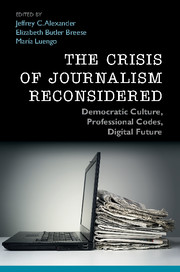Book contents
- Frontmatter
- Dedication
- Contents
- About the Contributors
- Preface
- Acknowledgments
- Introduction: Journalism, democratic culture, and creative reconstruction
- PART I THE CRISIS NARRATIVE
- 1 The perpetual crisis of journalism: Cable and digital revolutions
- 2 The crisis of public service broadcasting reconsidered: Commercialization and digitalization in Scandinavia
- 3 Beyond administrative journalism: Civic skepticism and the crisis in journalism
- 4 The many crises of Western journalism: A comparative analysis of economic crises, professional crises, and crises of confidence
- 5 The crisis in news: Can you whistle a happy tune?
- PART II FEARS OF DIGITAL NEWS MEDIA: THE SYMBOLIC STRUGGLE
- PART III PROFESSIONAL JOURNALISM, CIVIL CODES, AND DIGITAL CULTURE
- Conclusion: News innovations and enduring commitments
- Index
- References
3 - Beyond administrative journalism: Civic skepticism and the crisis in journalism
from PART I - THE CRISIS NARRATIVE
Published online by Cambridge University Press: 05 June 2016
- Frontmatter
- Dedication
- Contents
- About the Contributors
- Preface
- Acknowledgments
- Introduction: Journalism, democratic culture, and creative reconstruction
- PART I THE CRISIS NARRATIVE
- 1 The perpetual crisis of journalism: Cable and digital revolutions
- 2 The crisis of public service broadcasting reconsidered: Commercialization and digitalization in Scandinavia
- 3 Beyond administrative journalism: Civic skepticism and the crisis in journalism
- 4 The many crises of Western journalism: A comparative analysis of economic crises, professional crises, and crises of confidence
- 5 The crisis in news: Can you whistle a happy tune?
- PART II FEARS OF DIGITAL NEWS MEDIA: THE SYMBOLIC STRUGGLE
- PART III PROFESSIONAL JOURNALISM, CIVIL CODES, AND DIGITAL CULTURE
- Conclusion: News innovations and enduring commitments
- Index
- References
Summary
INTRODUCTION
From the Knight Foundation's extensive funding and research efforts around “the information needs of communities” to recent scholarly work on “computational” and “data” journalism, practitioners and scholars alike have looked to the rise of digital media and the profusion of databases as new opportunities to provide better information to the public and hold state actors and other elites accountable. While these forms of what I call “administrative journalism” are certainly valuable, the focus on “data” and privileging of cognitive and rational models of what Michael Schudson has called “information-based citizenship” has limited the conversation among reformers about what journalism is, as well as what it could and should be.
This chapter argues that the present narratives around the crisis in journalism have roundly overlooked the civic values that journalists are uniquely positioned to articulate and defend, and that provide both social solidarity and evaluative criteria for holding the powerful to account. I argue that, as an ideal, we should normatively value journalism as a form of institutionally organized “civic skepticism,” where journalists exercise scrutiny over elites and institutions, seeking to hold them to account for the democratic values of the civil sphere – equality, liberty, and justice – through their literal and symbolic control over the publicity of the powerful. While journalism often fails to live up to this ideal, valuing civic skepticism necessarily recasts the debate over journalism's future – from an emphasis on correcting for market failures in the provision of information, to a focus on the value of a strong and enduring institution that expressly serves the democratic function of holding power to account for the values of the civil sphere. This chapter concludes with a discussion of how the normative valuation of journalistic civic skepticism has implications for how we think about journalistic practice, the economics of the industry, and journalism as an institution.
Numbers guru Nate Silver received widespread, and justified, acclaim for his social science-based approach to election forecasting during the 2008 and 2012 U.S. presidential elections. Many pundits and scholars of journalism, as well as journalists themselves, cited Silver as a new model for a journalism that is less speculative, more “rigorous,” and (quantitative) evidence-based. Indeed, after starting out independently, Silver found homes at both The New York Times and now, ESPN, for his brand of statistical reporting.
- Type
- Chapter
- Information
- The Crisis of Journalism ReconsideredDemocratic Culture, Professional Codes, Digital Future, pp. 59 - 76Publisher: Cambridge University PressPrint publication year: 2016
References
- 14
- Cited by

